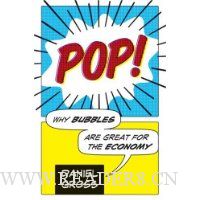
基本信息出版社:HarperBusiness
页码:240 页
出版日期:2007年05月
ISBN:0061151548
International Standard Book Number:0061151548
条形码:9780061151545
EAN:9780061151545
版本:1
装帧:精装
正文语种:英语
外文书名:砰: 为什么说泡沫对经济非常重要
内容简介
Bubbles—from hot stocks in the 1920s to hot stocks in the 1990s—are much-lamented features of contemporary economic life. Time and again, American investors, seduced by the lures of quick money, new technologies, and excessive optimism, have shown a tendency to get carried away. Time and again, they have appeared foolish when the bubble burst. The history of finance is filled with tragic tales of shattered dreams, bankruptcies, and bitter recriminations.
But what if the I-told-you-so lectures about bubbles tell only half the story? What if bubbles accomplish something that can only be seen in retrospect? What if the frenzy of irrational economic enthusiasm lays the groundwork for sober-minded opportunities, growth, and innovation? Could it be that bubbles wind up being a competitive advantage for the bubble-prone U.S. economy?
In this entertaining and fast-paced book—you'll laugh as much as you cry—Daniel Gross convincingly argues that every bubble has a golden lining. From the 19th-century mania for the telegraph to the current craze in alternative energy, from railroads to real estate, Gross takes us on a whirlwind tour of reckless investors and pie-in-the-sky promoters, detailing the mania they created—but also the lasting good they left behind.
In one of the great ironies of history, Gross shows how the bubbles once generally seen as disastrous have actually helped build the commercial infrastructures that have jump-started American growth. If there is a secret to the perennial resilience and exuberance of the American economy, Gross may just have found it in our peculiar capacity to blow financial bubbles—and successfully clean up the mess.
作者简介
Daniel Gross, the "Moneybox" columnist for Slate, is the author of several books and is a contributor to the "Economic View" column in the Sunday New York Times. His writing also appears frequently in magazines such as New York and Wired. Gross was educated at Cornell University and holds an A.M. in American history from Harvard University. He lives with his family in Connecticut.
媒体推荐 "Gross?s thesis is...thought-provoking...for modern investors, particularly given that the bubble phenomenon shows no sign of disappearing." -- Financial Times
"It?s hard to resist crossing your fingers...hoping that the next bubble bursts while you?re still around to enjoy it." -- New York Observer
"The sort of analysis that makes economics and investing so intriguingly fascinating." -- Barry Ritholtz, The Big Picture
"This is a stimulating book, worth your time and money." -- Tyler Cowen, Marginal Revolution
In his new book Pop! Why Bubbles Are Great for the Economy, business journalist Daniel Gross makes the contrarian-but-persuasive case that irrational exuberance and its aftermath have made the U.S. economy a juggernaut. -- Jeff Ostrowski, Palm Beach Post
Pop!?s good old-fashioned historical narrative is refreshingly unambiguous in its lessons for investors.
-- Barron's
Sizzle! Pow! Bam! Business history gets feisty in this attention-deficit-friendly guide to American booms and busts. Gross' angle: Bubbles are good for us, or at least they're not as bad as you might think. . . fast stats and light pace make the "dismal science" seem less dismal. -- Conde Nast Portfolio
Sizzle! Pow! Bam! Business history gets feisty in this attention-deficit-friendly guide to American booms and busts. -- Conde Nast Portfolio
The sort of analysis that makes economics and investing so intriguingly fascinating. -- Barry Ritholtz, the Big Picture
This is a stimulating book, worth your time and money. -- Tyler Cowen, Marginal Revolution
专业书评 From Publishers Weekly
Starred Review. Three cheers for "exuberant, foolish, mad overinvestment!" Slate columnist Gross takes a counterintuitive look at economic bubbles—those once-in-a-generation crazes that everyone knows can't last, and don't. With each one, we lament having gotten in too late, and then not having gotten out soon enough, and finally shake our heads at the inevitable bankruptcies and lost jobs and general financial wreckage. The pattern is all too familiar, which is why Gross's argument is so intriguing: that these bubbles, with their hype and madness and overenthusiasm, are not to be feared—they're actually a primary engine of "America's remarkable record of economic growth and innovation." The author surveys modern bubbles and finds the benefits far more durable than the disruptions: in each case, most investors flopped, but businesses and consumers found themselves with a "usable commercial infrastructure" that they quickly put to new uses. The telegraph "led to the creation of national and international financial markets"; extra railroad lines made national consumer brands possible and gave consumers access to distant stores; extra fiber-optic capacity gave everyone Internet access after the bust. Gross drops zingers throughout his cheery history, amusingly highlighting parallels between past and current bubbles. He concludes—with admirable practicality—by calling for a "real bubble" to jump-start alternative-energy programs. (May)
Copyright © Reed Business Information, a division of Reed Elsevier Inc. All rights reserved.